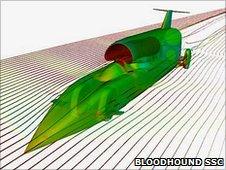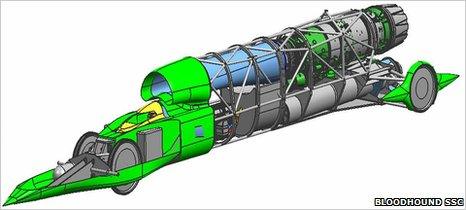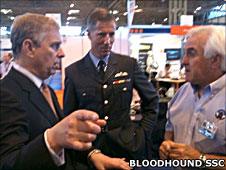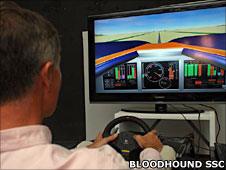Bloodhound diary: A tale of two halves
- Published
RAF fighter pilot Andy Green intends to get behind the wheel of a car that is capable of reaching 1,000mph (1,610km/h). Powered by a rocket bolted to a Eurofighter-Typhoon jet engine, the Bloodhound car will mount an assault on the land speed record.
Wing Cmdr Green is writing a diary for the BBC News Website about his experiences working on the Bloodhound SSC (SuperSonic Car) project and the team's efforts to inspire national interest in science and engineering.
GETTING IT RIGHT, FROM THE FRONT TO THE BACK

The "Holy Grail" – the aerodynamic solution at 1,000mph
There's so much going on at the moment that I don't know where to begin.
Four months ago we were still wrestling with a five-tonne car that developed 10 tonnes of lift at 1,000mph (which, from my point of view as the driver, is really not a good thing).
Solving this problem for a car travelling at over 1,000mph is described by our computer modelling genius, Ben Evans, as "finding the Holy Grail, external".
After three years of cutting-edge aerodynamic research, he's right to be that excited.
We've known for a while that we can do this astonishing 1,000 mph land speed record - now we know how.
With this huge success behind us, the team continues to charge ahead with the detailed design of BLOODHOUND SSC.
We're now signing up product sponsors to build big chunks of the car.
A major UK aerospace company (can't tell you who just yet - they will announce it shortly) has agreed to make the whole back end of the car.
Bloodhound divides neatly into two parts for manufacture.

Carbon-fibre front end, steel space-frame at the rear
The carbon-fibre front end contains the hugely strong cockpit structure and the aerodynamic nose, which will endure aero loads of up to 12 tonnes per square metre at 1,000mph.

Education Director Dave Rowley explains the Bloodhound Education Programme to The Duke of York
The back end of the car is a steel frame, which has to take the nine tonnes of jet thrust from the EJ200, plus 12 tonnes of thrust from the Falcon hybrid rocket, plus the vibration and temperature from both jet and rocket, plus all the suspension loads.
Then, right after the thrust stops, there's nine tonnes of brake chute drag to deal with. How hard can that be?
I expect I'll find out, once I'm strapped into it - glad we've got someone really good to make the frame.
We've agreed the brake chutes that we want: high-speed (over 600mph) for the desert running in South Africa and low-speed (250mph) for UK runway testing.
The steering wheel design, external will be made by a process called "Additive Layer Manufacturing" (the shape is literally "grown" using a laser - it's like watching science fiction).

To stop Bloodhound SSC during runway tests, we will copy the RAF
The manufacturing list goes on - you can understand why we're excited about it.
We're also hugely busy with a full programme of public shows, external this summer.
This project is about education and public involvement - and that means getting out there to show people what we're doing.
I work full-time for the Royal Air Force, so mostly I'm only let out to play at the weekends. I made it to a couple of events, including the MACH Show at the NEC, where HRH The Duke of York came to find out more about the education programme.
July is going to be even busier - the Goodwood Festival of Speed (where we have bragging rights on speed), the F1 Grand Prix (where we have bragging rights on power - even our rocket pump motor has 800hp) and our biggest event this summer: Farnborough International Air Show.

Developing the Bloodhound Driving Experience – it’s quite a ride!
We will be unveiling our new, full-size (12.8m long) show car at Farnborough, which represents the final aerodynamic shape.
Quite simply, it's stunning - the world has never seen a car like this before.
Farnborough Airshow will also be the debut for our "Bloodhound Driving Experience, external". Based on a driving simulator, our IT partner Intel has helped us to build the first version of a Bloodhound test cockpit.
It gives you (and me!) the first chance to see what it's like to drive 10 miles in 36 seconds, in a 1000mph jet-rocket car.
I've been helping to develop the software and tried it again last night. It's remarkable. Fantastically quick. And a bit scary. Come and try it for yourself.